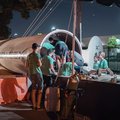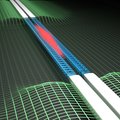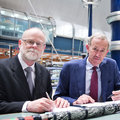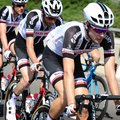Latest News
22 July 2018
Delft Hyperloop in final of the SpaceX Hyperloop Pod Competition

On Sunday 22 July, the Delft Hyperloop student team from TU Delft competes in the final of the Hyperloop Pod Competition at SpaceX headquarters in Hawthorne, California. During the final, four student teams take on the challenge of racing through a 1.2-kilometre test tunnel, built by SpaceX in 2016. The Hyperloop is a super-high-speed futuristic mode of transport, conceived by Elon Musk.
20 July 2018
Uncovering the interplay between two famous quantum effects

The Casimir force and superconductivity are two well-known quantum effects. Separately, these phenomena have been thoroughly studied.
16 July 2018
Seven Veni’s for TU Delft researchers

NWO has announced the Veni recipients for 2018. Amongst them are seven scientists from Delft University of Technology.
16 July 2018
TU Delft starts top research facility for energy system of the future

The integration of new technologies in the energy system is a vital aspect of the energy transition. As yet there are no facilities for testing new components in the high-voltage grid. TU Delft is changing this situation by building the ESP Lab (Electrical Sustainable Power Lab, Powered by TenneT). This lab will be a unique facility for top-class research into system integration in the energy system. This research is needed to be able to develop the energy system of the future.
10 July 2018
Environmental benefits of pay-per-wash business model revealed

Researchers from TU Delft and Lund University (Sweden) have demonstrated in practice that paying per wash results in the more economical use of washing machines. Their findings are being published in the Journal of Cleaner Production.
06 July 2018
Delft simulation model for optimum performance during team time trials

During his Mechanical Engineering degree programme, TU Delft student Mats Overtoom came up with a mathematical model that could provide answers to such questions as ‘What is the optimum changeover schedule for a cyclist in a team time trial?’ and ‘How fast does he need to cycle up a mountain to reach optimum performance?’. The input for the simulation model was data from cyclists from Team Sunweb and specific track information. It gives the Dumoulin team strategic tips for optimum performance, the best order of the cyclists and the length of turns on the front during a team time trial.
04 July 2018
Extreme sea levels predicted to increase along global coastlines

Future global warming will lead to an increase in ‘extreme sea levels’, with consequent flood risks to coastal infrastructure and human populations. An international research team from Italy, Greece, the Netherlands (TU Delft / Deltares) and the UK published this new research in Nature Communications.
03 July 2018
Metrology institute NMi relocates to TU Delft Campus
This summer, metrology institute NMi will relocate to the TU Delft Campus. The company – which specialises in testing, certifying and training in the field of metrology...
02 July 2018
Cees Dekker surprised with Best Professor Award 2018

On Monday 2 July, Cees Dekker, Professor of Molecular Biophysics at the Faculty of Applied Sciences (AS), was surprised...
27 June 2018
QuTech’s Menno Veldhorst named to MIT Technology Review’s 2018 Innovators Under 35 List
Menno Veldhorst has been named to MIT Technology Review’s prestigious annual list of Innovators Under 35. Menno Veldhorst has invented a faster path to real-world quantum circuits by making it possible for them to be printed on silicon—the way computer chips have been printed for decades. Prior to Veldhorst’s innovation, it was considered impossible to make usable, semiconductor-based quantum circuits on silicon that would be stable enough to perform useful calculations.
